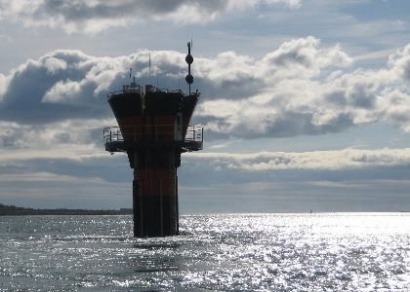
SeaGen, the world’s first commercial-scale offshore tidal energy turbine, is the first tidal farm planned for Kyle Rhea, a strait of water between the Isle of Skye and the Scottish mainland. It is likely to have a maximum power of 8 MW and have the capacity to generate electricity for up to 8,000 homes in the Highlands & Islands by harnessing the power of the fast tidal currents that pass through Kyle Rhea. Marine Current Turbines (MCT) is aiming to deploy the Kyle Rhea tidal farm by 2014.
MCT estimates that the cost of their Kyle Rhea scheme will be £40million which will be provided by a combination of private sector finance and potentially UK Government support via the Low Carbon Innovation Fund or another government funding stream that focuses on the development of marine energy in the UK.
The securing of the Agreement for Lease agreement from The Crown Estate follows MCT’s recent passing of the UK Government’s operating performance criteria for the UK’s emerging tidal and wave energy technologies. MCT’s SeaGen tidal turbine, which has been operating in Northern Ireland’s Strangford Lough since 2008, is the first ever tidal or wave energy device to have passed this milestone, set by the UK Department of Energy & Climate Change.
MCT expects to submit a planning application to Marine Scotland, part of the Scottish Government, in early 2012 once the project’s baseline surveys and impact assessments have been completed.
For the past 12 months, MCT with the support of the environmental consultancy Royal Haskoning (based in Edinburgh) has undertaken a series of environmental and technical studies and consulted a range of local and national organisations including the Highland Council, Marine Scotland, the Maritime & Coastguard Agency, the Northern Lighthouse Board, the RSPB, the Glenelg and Arnisdale Development Trust and the RNLI based at Kyle of Lochalsh.
“Securing The Crown Estate’s approval is a vital part of the process to deliver Scotland’s first tidal farm and set the UK on the path towards having a significant marine energy industry within the next decade,” said Martin Wright, CEO of Marine Current Turbines.
Meanwhile, Johanna Yates, Scottish Renewables Offshore Policy Manager said: “Today’s announcement shows Scotland is entering the next phase of its development with our wave and tidal scaling up from single prototypes to large scale developments. This project in Kyle Rhea illustrates the growth of the marine sector, and it is these kinds of plans in Scottish waters that will not only maintain but enhance our global lead in this technology.”
Tidal needs a push
However, Wright has called upon the UK and Scottish Governments to recognise the opportunity that tidal and wave energy offers in terms of delivering new jobs, predictable low carbon generation and greater energy security, by increasing incentives over the next 12 months. “Specifically we believe that 5 Renewable Obligation Certificates, rather than the present 3 in Scotland for tidal, is crucial to attract the investment that is required,” he said.
The Renewables Obligation is the main support scheme for renewable electricity projects in the UK. It places an obligation on UK suppliers of electricity to source an increasing proportion of their electricity from renewable sources. A Renewables Obligation Certificate is a green certificate issued to an accredited generator for eligible renewable electricity generated within the United Kingdom and supplied to customers within the United Kingdom by a licensed electricity supplier. One ROC is issued for each megawatt hour (MWh) of eligible renewable output generated.
For additional information:

